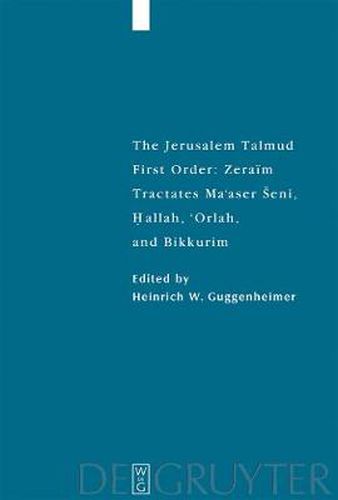Readings Newsletter
Become a Readings Member to make your shopping experience even easier.
Sign in or sign up for free!
You’re not far away from qualifying for FREE standard shipping within Australia
You’ve qualified for FREE standard shipping within Australia
The cart is loading…






This title is printed to order. This book may have been self-published. If so, we cannot guarantee the quality of the content. In the main most books will have gone through the editing process however some may not. We therefore suggest that you be aware of this before ordering this book. If in doubt check either the author or publisher’s details as we are unable to accept any returns unless they are faulty. Please contact us if you have any questions.
This volume concludes the edition, translation and commentary of the first order of the Jerusalem Talmud . It contains four small but important tractates. The first, Ma'aser Seni , deals with Second Tithe (Deut. 14:22-27) and the fourth-year fruit of a newly planted tree (Lev. 19:24). This is sanctified food, to be consumed by the laity at the holy precinct, for which redemption is expressly authorized. The tractate deals in large part with the problems of redemption of dedicated food. In addition, there is a long section on the interpretation of dreams, and a detailed description of the ceremony of presentation of the tithe in the Temple. The second tractate, Hallah , details the application of the general rules of heave to the Cohen’s part of any bread dough. The third tractate, ‘Orlah , the fruits of a newly planted tree during the first three years (Lev. 19:23), treats this as paradigm for all food whose usufruct is forbidden, and most of the tractate discusses the problems that may arise if any such food is not immediately disposed of. The last tractate, Bikkurim , describes the rules for selection and presentation of First Fruits in the Temple on or after Pentecost. The rite is given in detail, with an excursus on the honour due elders. The first appendix shows the position of the Tosephta as intermediary between Yerushalmi and Babli tradition, with a distinct slant towards Babylonian positions. A second appendix tries to identify the main authors of the tractates of this first order.
$9.00 standard shipping within Australia
FREE standard shipping within Australia for orders over $100.00
Express & International shipping calculated at checkout
This title is printed to order. This book may have been self-published. If so, we cannot guarantee the quality of the content. In the main most books will have gone through the editing process however some may not. We therefore suggest that you be aware of this before ordering this book. If in doubt check either the author or publisher’s details as we are unable to accept any returns unless they are faulty. Please contact us if you have any questions.
This volume concludes the edition, translation and commentary of the first order of the Jerusalem Talmud . It contains four small but important tractates. The first, Ma'aser Seni , deals with Second Tithe (Deut. 14:22-27) and the fourth-year fruit of a newly planted tree (Lev. 19:24). This is sanctified food, to be consumed by the laity at the holy precinct, for which redemption is expressly authorized. The tractate deals in large part with the problems of redemption of dedicated food. In addition, there is a long section on the interpretation of dreams, and a detailed description of the ceremony of presentation of the tithe in the Temple. The second tractate, Hallah , details the application of the general rules of heave to the Cohen’s part of any bread dough. The third tractate, ‘Orlah , the fruits of a newly planted tree during the first three years (Lev. 19:23), treats this as paradigm for all food whose usufruct is forbidden, and most of the tractate discusses the problems that may arise if any such food is not immediately disposed of. The last tractate, Bikkurim , describes the rules for selection and presentation of First Fruits in the Temple on or after Pentecost. The rite is given in detail, with an excursus on the honour due elders. The first appendix shows the position of the Tosephta as intermediary between Yerushalmi and Babli tradition, with a distinct slant towards Babylonian positions. A second appendix tries to identify the main authors of the tractates of this first order.